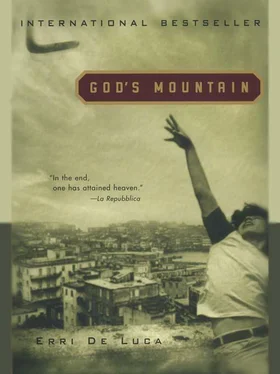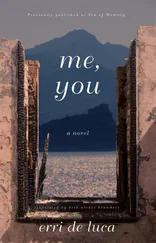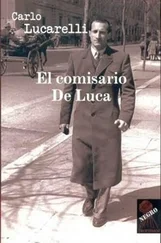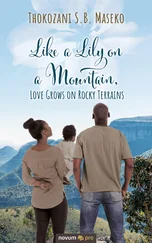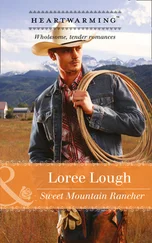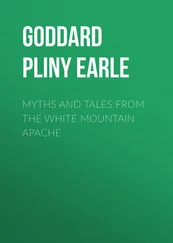
OTHER POOR people don’t make as much of a ruckus, but from their hoarse little voices come blessings as powerful as a cannon shot. Rafaniello answers, “ Mirzasè,” which in his language means “if God wishes.” No prince carries the blessings that you find in the bones of the poor, which start in their feet, run through their entire body, and spring from their mouths. The poor have a gratitude that no king has ever felt, and they push Rafaniello closer to Jerusalem. So he says, and I believe him. At lunchtime the workshop closes; Rafaniello takes off his jacket and asks me what I see on his hump. I see a cut, a purple spot on the top. It’s starting to break, he says, like an eggshell. I slip the boomerang into the piece of string I sewed inside my jacket and climb the hill toward home.

I PASS the landlord on the stairs. I bite my tongue to avoid saying hello. He doesn’t notice me. He’s climbing fast, out of breath, goes past his own floor, goes to Maria’s. I can see that he’s carrying a box of pastries. For the first time I think of the boomerang I’m wearing as a weapon. I’d like to throw it at him. The wood turns heavy at the evil thought. I enter the house. It’s empty, quiet. I open the windows and let in the autumn air, rotting on the southwest wind. Mama hasn’t come back. Papa walks around the house without speaking. He doesn’t come in to see if I’m in my room, if I’m asleep. We’ve grown apart. I put food on the table with the money he leaves me. On a piece of paper I write down what I spent and leave him the change. For now I’m holding on to my pay from Master Errico. I remember the verses Mama used to sing when she’d sit beside me for a minute after we’d said our bedtime prayers: “Oi suonno vieni da lo monte / viènici palla d’oro e dàgli ‘nfronte / e dàgli ‘nfronte senza fargli male.” O sleep, come from the hills, come to us, golden moon, and strike him in the head, strike him in the face, but don’t hurt him. The music would weigh upon my eyes and close them. Now I turn in without saying good night. Lying on my side, I send myself to sleep, as Rafaniello says when he goes to bed.
I STILL say my prayers. There’s no window inside the closet where I sleep, so while I say my prayer to the Guardian Angel I imagine I’m up by the washbasins with the wide-open sky taking the place of the ceiling. I don’t think I’m praying out of faith, just out of habit, so as not to lose the last words of the night. Rafaniello says that God is forced to exist by virtue of our insistence. By virtue of our prayers His ears are shaped, by virtue of our tears His eyes can see, by virtue of our joy His smile appears. Just like the boomerang, I think. By virtue of practice I prepare the throw, but can practice give rise to faith? I write down his words. Maybe later on I’ll understand them. He says you should sing to air your thoughts, otherwise they’ll grow moldy in your mouth. If I start singing with this cracked voice of mine, we’ll be having a music festival in here! Master Errico wants to be heard over the sound of the planing machine. Don Rafaniè, I ask, you don’t think that by virtue of staying in Naples you’ve become Neapolitan? No, he jokes, but the Neapolitans just might be one of the ten lost tribes of Israel. What? You lost ten tribes? So how many are left? “Just two. One of them is the tribe of Judah, whom the Jews are named after. It’s a name that comes from the verb ‘to thank.’ ” So the Jews are really named “thank you”? “That’s what the word says, but all living people should be named this way, with a word of thanks.”

TODAY IN the warm little sun of November the alleyway people leaned their heads out the windows, pushed their chairs in the street a little closer to the brazier. “É asciuto, ‘o pate d’e puverielle,” says Master Errico. The father of the poor has come out. In the cold months the sun places its own blanket over the shoulders of those who don’t have one. The voices of the street vendors rise in Montedidio, taking advantage of the open windows to call out their wares from the streets to the rooms. “Olives from Gaeta, I’ve got olives, sweet as rock candy, lower your baskets.” Their shouts bring people to the windows. I couldn’t keep my eyes off the street while I was working. It’s not that I wanted olives. I wanted to go out. I’m learning that work is all about being good and doing your job while outside a low sun comes and goes in an instant. Evening falls and you’re still cooped up in the shop. You saw the sun go by and didn’t have a chance to greet it. Sing, Rafaniello says, thoughts need to be released, to find a way out. I nod in agreement, but not even broken breath comes out of my mouth. If I were outside, then maybe a song would break out, but only my eyes can go outside. The door is open. The sea breeze carries the smell of the docks all the way up here. I feel like I’m smelling my father’s jacket, grease and salt, tar and rust. I forget my melancholy. Rather than sing, rather than sigh, I breathe in through my nose the sea air and the wind. The cries of the olive vendor come closer. I think of my father inside the hold of some ship and maybe he, too, feels like coming up for air. He deserves it more than I do. This is my first encounter with sadness.
IN SUMMER my mother used to take me outside the gate, where we waited for his shift to end. You never knew whether he would get out on time or have to stay and put in more hours. I’d be right outside, looking at the people on the Beverello pier getting on the white ferryboats of the Naples port authority. They were on their way to the islands, getting on and off board in straw hats. There was always someone who’d been scorched by the sun. Mama would laugh at how much they looked like tomatoes. “Sbarcano ‘e pummarole.” The tomatoes are landing! She never went sunbathing, never went to the beach. I’ve still never gotten on a ferryboat, but if I do I sure won’t wear a straw hat. We would wait for Papa, and when he came out, fresh and clean with his hair slicked back, in his good jacket and a white shirt buttoned up to the collar, we were the best-looking family on the promenade. We would walk as far as Mergellina, passing by the Santa Lucia neighborhood. He would buy me a tarallo from Castellamare. Mama would give him her arm. I would be on his other side holding his open hand. People stepped aside so as not to disturb our formation. In Naples they respect families. When the paths of two families cross they say hello.
PAPA IS as tall as the wardrobe and just fits under the doorjamb. On the street he cuts quite a figure beside other men. Mama is tall, too, with dark black hair. She’s skinny. In her face you can see her nerves. When a sudden gesture seizes her she’s dangerous. She snaps like a spring, breaking the things around her. She bends her fork while she’s eating if a thought makes her cross. I stopped giving her my hand when we went for walks. Sometimes she’d be lost in her thoughts and squeeze it so hard I would cry. Papa says she’s stronger than him. On the promenade I don’t think any child was prouder than me. Even in front of the sailing clubs where the gentlemen with the money go, in the shadow of my two giants I felt like I had a fortune that no one could match.
WE USED to walk along the promenade by the Villa Comunale when the shoreline fishermen were hauling in the big net. There were six men to an end, all tugging together. The oldest one kept time, shouting heave-ho. The rope snaked from shoulder to shoulder, dragging the sea into land. The net came closer, wide and slow, while the two lines piled up in loops on the street. When the net came in, the fish sparkled, their whiteness leaping, flapping their tails by the hundreds, the net unloaded on dry land the pile of life stolen from the waves. Papa would say, “Behold the flames of the sea.” The smell of the waterfront was our perfume. In the peace-fulness of a summer day, when the sun was down, we’d stand there wordlessly, close to each other. We used to do it until last year. Until last year I was still a child.
Читать дальше
